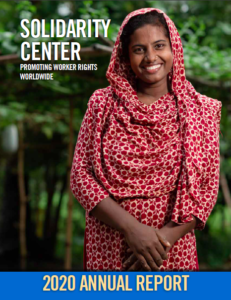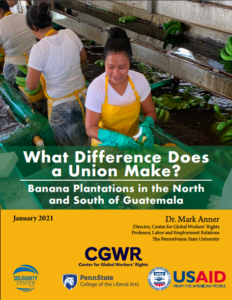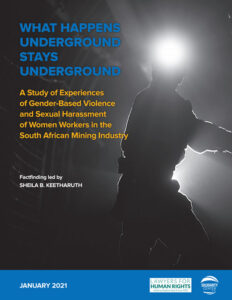 |
 |
 |
A joint analysis of the draft law, conducted by the Solidarity Center, CCHR and the International Trade Union Confederation, argued it did not adhere to international standards and best practices.
A study on violence and harassment at work found that 20 of 80 countries surveyed had no laws to protect workers from retaliation if they reported sexual harassment, and 19 did not even have a legal definition of sexual harassment at work, writes the Solidarity Center’s Lisa McGowan. But there is a way forward. Hundreds of workers, their unions and human rights allies are at the International Labor Organization (ILO) in Geneva this week and next, where they are pushing for a global rule that includes include strong protections against gender-based violence at work.
“We saw some positive signs, especially a move by the government to free a trade unionist who was in prison, who had been tortured, [but] we want to see the acknowledgment of the problem go all the way down the line—all ministries and all levels of government,” said the Solidarity Center’s Eastern Europe/Central Asia Director, Rudy Porter.
David Welsh, country director in Southeast Asia for the Solidarity Center, a U.S.-based workers’ rights organization, says major clothing companies fail to prioritize their employees. “The brands control and seek out specific market dynamics, and it’s a deliberately exploitative system,” he noted.
We need to hold every new deal we see in supply chains up to the now gold standard of the Accord,” says Shawna Bader-Blau, executive director of the Solidarity Center. “No more Rana Plazas. We need something better and it is up to us to make it happen, and freedom of association is key…”
The number of registered unions in Bangladesh has increased about fivefold to almost 500 since 2013, according to Jennifer Kuhlman of U.S.-based workers’ rights charity Solidarity Center. “Many of them are being headed by young, dynamic women who are choosing to lead from the front to bring about change,” said Kuhlman, who heads its Bangladesh programs.
Shawna Bader-Blau, executive director of the Solidarity Center, said, “Every time there is new initiative to regulate corporate behavior through supply chains, it is incumbent on all of us to insist freedom of association and the right to collective bargaining be included… It just doesn’t happen. Most of the time, multi-stakeholder initiatives … center on every other form of rights but human rights in the supply chain.”
“Markets and corporations don’t magically conjure up shared prosperity,” said executive director of the Solidarity Center Shawna Bader-Blau. “It’s the agency of individual citizens coming together collectively… that push governments and corporations to make changes to the way our economies and democracies work that make them more fair.”
A dialogue organized by the Council of Global Unions Working Group on Migration (CGU-WGM) and the International Labor Organization (ILO) was convened during the third round of negotiations on the United Nations Global Compact for Safe, Orderly and Regular Migration in New York this week, moderated by Neha Misra, Solidarity Center senior specialist for migration and human trafficking.
According to a report by Ledriz and the Solidarity Center, the failure to pay what workers are legally entitled to is wage theft. It is also a violation of international labor standards, as well as national legislation on the employment of workers said the report, Working Without Pay: Wage Theft in Zimbabwe.